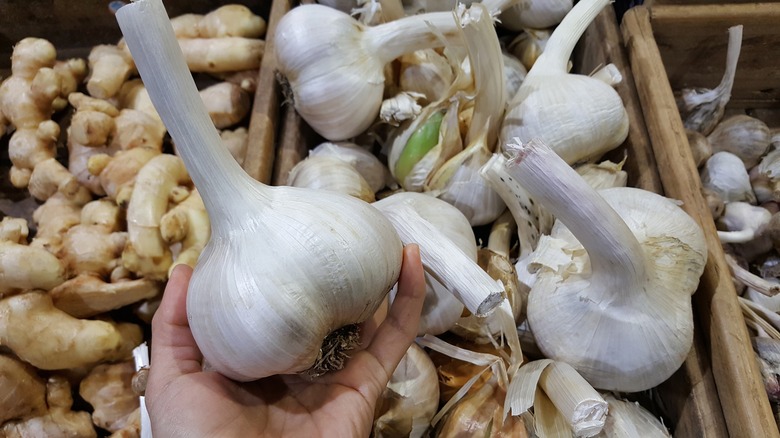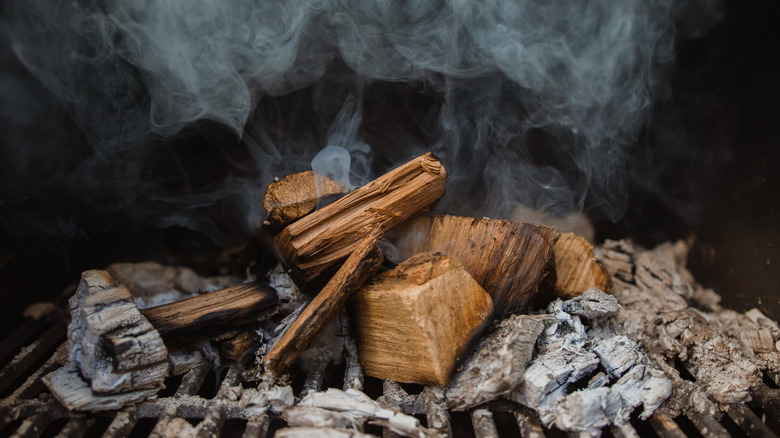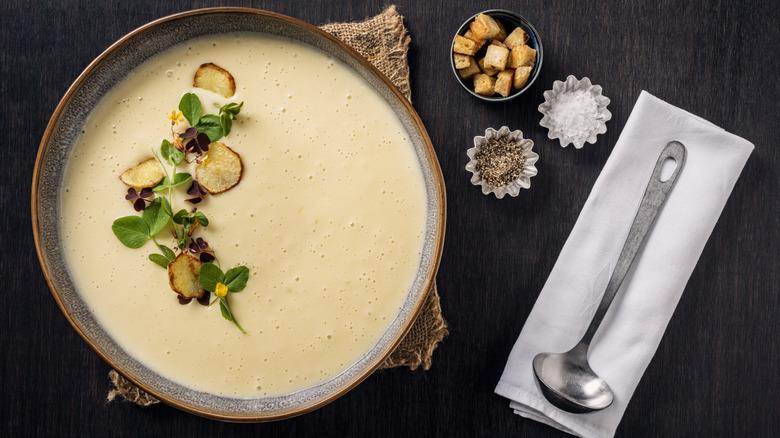Why Professional Chefs Love Smoked Elephant Garlic
Just when you think you know an ingredient, suddenly you find out a whole new side to it. We're looking at you, garlic. Though you've likely encountered the compact white and purple bulbs at the grocery store, elephant garlic is an oversized variety that grows to about double the size of other types. Though many assume the extra-large cloves will deliver an over-the-top punch, the species is actually a member of the leek family and is quite mild. The flavor is so mellow, in fact, that it's not actually a good substitute for traditional cloves.
Instead, cooks use elephant garlic raw in dressings and dips for a gentle boost. The toned-down flavor is also known to win over eaters that normally avoid the pungent produce. Recently, however, chefs have begun shouting out other applications for the ingredient — once it's been smoked and the flavor amplified. Professionals are turning to the power of heat and wood to elevate the mild vegetable into a more versatile and rich kitchen staple.
Oklahoma-based chefs Jonathon Stranger and Russ Johnson even go so far as to name the enriched cloves their secret weapon. "It has this amazing smoky, sweet, earthy, super-umami flavor to it," Johnson shared with Food & Wine, adding there are so many ways to use it. "Slice it, puree it, put it into sauces."
Understanding smoked alliums
Ready to transform the humble ingredient? Smoked elephant garlic is available in stores and online, but you can also try making your own. As with meats and fish, you can cold or hot smoke whole heads of any variety of garlic. Cold smoking occurs at a lower temperature, which means the ingredient emerges well-perfumed, slightly dried, and better preserved, but not cooked through as it would with hot smoking. To better penetrate and infuse the layered bulbs, some producers prefer to hot smoke.
Home cooks can lean into electric smokers and follow the common path of hot smoking with oak wood, or experiment to create a version that fits their tastes. For a flavor similar to bacon, try mixing in apple wood chips to evoke the protein's trademark scent. Amateur smokers tend to slice off the tops before giving the heads, skin and all, an hour on a fragrant grill.
Before you start, check your local grocery or farmers market to track down the elephant variety, which will likely be most plentiful over the summer when it's in season. Keep your finished hot smoked cloves in the fridge after you're done preparing them. If you're not planning to eat the garlic within a few days, consider freezing the leftovers to give yourself more time.
Putting smoked garlic to use
There aren't many "wrong" ways to use the vegetable — though we're still not sold on sweet applications like garlic ice cream — but there are dishes where the smoked seasoning can help ingredient pairings shine even brighter. Take the perfect umami combo, miso and garlic, for instance. Adding the elephant cloves, which bring umami and deep flavors of their own, can heighten this combination, and in turn elevate mashed potatoes, ramen, or even chicken.
Vegetarians can also utilize the alliums in stews, braises, and sauces, and its smoky scent may even lend a meat-like savoriness. The mild ingredient also shines in vinaigrettes, which means it could be perfect for a bacon-free Cobb salad. And because the elephant variety is closer in flavor to a leek, you can also experiment with adding it to leek-centric egg, rice, and potato dishes.
Or let the ingredient stand on its own. Mash the giant cloves into a paste to create a wildly nuanced spread for sandwiches, toasts, and charcuterie boards. Treat it as you would roasted or confit garlic, and try combining it with cheese, roasted tomatoes, and herbs for a savory snack.



